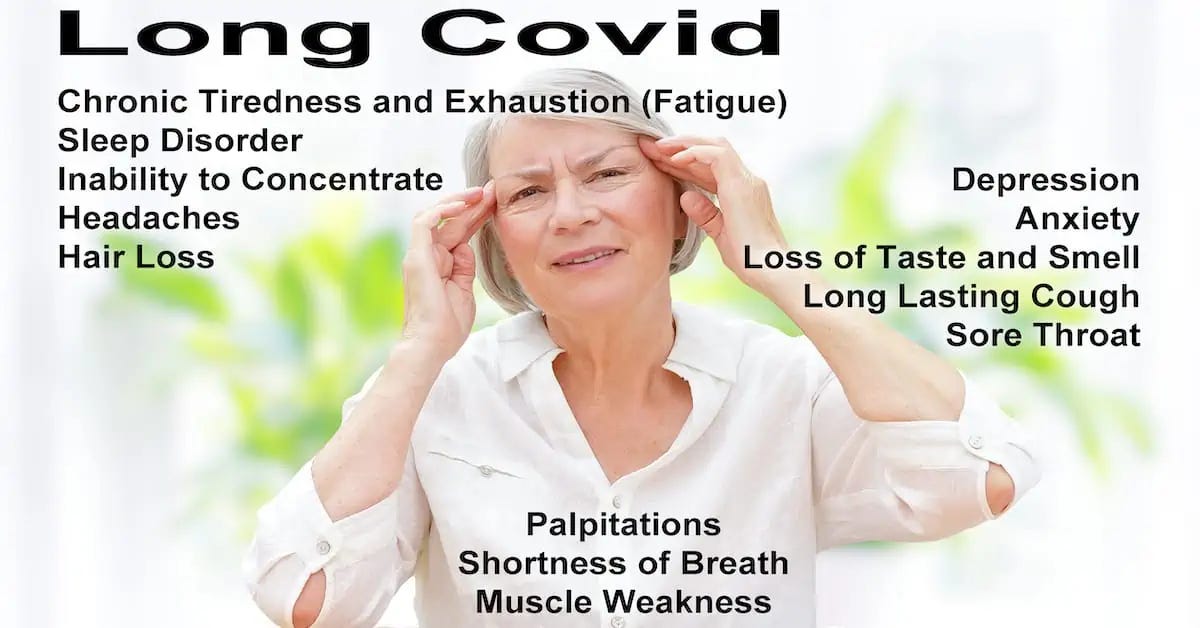Another Biden Failure: Long COVID Action Plan
Millions of sufferers should not expect help soon
More than 2 years after patients started reporting long-lasting symptoms after COVID infection, the Biden Administration announced its national long COVID plan.
The National Research Action Plan on Long COVID aims to improve prevention, diagnosis, and treatment for long COVID, which currently affects up to 23 million people in the U.S., about 1 million of whom may be out of the workforce at any given time because of the condition, according to Admiral Rachel Levine, MD, HHS assistant secretary for health.
As the long COVID coordinator, a role formalized with the announcement of a new Office of Long COVID Research and Practice, Levine is responsible for implementing the plan and overseeing the work of multiple government agencies, through the Long COVID Coordination Council.
Long COVID accounts for "many potentially overlapping entities, likely with different biological causes and different sets of risk factors and outcomes," Levine said in an interview with Kirsten Bibbins-Domingo, PhD, MD, MAS, JAMA editor-in-chief.
As a spectrum of conditions, long COVID can affect "nearly every organ system and can manifest as new-onset chronic disease such as heart disease, diabetes, kidney disease, hematologic disorders, neurologic conditions, and mental health disorders," Levine wrote in a JAMA editorial.
"The take-home message is that long COVID is real," she said. This is important because some people have asserted that long COVID is not a real medical, biologic and complex condition.
The federal action plan covers seven key areas of research: long COVID's clinical spectrum and diagnosis, pathophysiology, surveillance and epidemiology, patient wellbeing, therapeutics and interventions, human services and supports, and health services and economics research.
It is a prime example of bureaucratic avoidance of real action. Just lots of words.
The plan builds on ongoing research supported or conducted by the U.S. government and claims it will accelerate and expand it. It also calls for enhanced action by the private sector. But what exactly? Drug companies or health care companies? Note that the huge Intermountain Health in Utah recently dropped its long COVID navigation service that provided a key service.
Long COVID advocates expressed mixed opinions. Hannah Davis, co-founder of the Patient-Led Research Collaborative, noted the fact that "there's going to be an [Office of Long COVID Research and Practice] is pretty amazing." But that really is not very impressive.
But Davis voiced concerns about the scarcity of prevention efforts addressed by the plan. "I think there's still a feeling like we can get through this without minimizing cases, but we really need to be focused on prevention as well," she said. But how can you get prevention when most medical people still do not acknowledge micro blood clots as a fundamental cause, despte strong research evidence.
Diana Berrent, founder of Survivor Corps, said that the administration "nailed the institutional challenge of long COVID" but also thought the plan was insufficient.
"Millions of Americans, young and old, are suffering the aftermath of COVID and need immediate relief from their pain," Berrent said. "An established office in HHS is a welcome step but nothing short of actual treatments and therapeutics will do the trick." Exactly!
Berrent took issue with the action plan's public-private collaboration, stating the administration was "shirking" its responsibilities with that approach. Exactly!
"A call to action without funding is a cry into the dark," she said. "We need an 'Operation Warp Speed' for long COVID, and we shouldn't settle for anything less." Exactly; where are the billions of dollars?
Levine said the action plan, along with other government initiatives, were "the beginning ... and then we need to have an implementation strategy and a path as we move forward." She pointed out that 14 government agencies were involved in drafting the plan and are spearheading research efforts, including:
The NIH's RECOVER multi-study initiative that aims to study more than 17,000 people to understand long COVID biology and subtypes
The Department of Defense EPICC study, which tracks chronic symptoms and identify early symptom clusters, predicts return to health, and identifies long COVID subtypes
The NIAID/Children's National Hospital PECOS study, which assesses the long-term effects of pediatric COVID-19 and MIS-C in children
The Veterans Affairs EPIC3 study that focuses on pathological mechanisms and CORC-LTO study to estimate incidence, risk factors, and long-term outcomes
The Health Resources and Services Administration's NSCH-LC survey to evaluate long-term effects of the pandemic on children
The CDC's ongoing national health survey (NHIS) to track long COVID prevalence.
The CDC and Census Bureau's Behavioral Risk Factor Surveillance System (BRFSS) and Household Pulse Survey to help assess long COVID prevalence through self-report
As if the more government, the better the effort.
The Biden administration also released its Supports and Services for Longer-Term Impacts of COVID-19 report that highlighted resources and programs for long COVID patients, bereaved persons, and people experiencing behavioral health effects of COVID-19.
Overall, this is just another failure to mount an effective effort to help millions of people. And as more people keep getting infected (because vaccines do not work) the number will increase. And many people believe that COVID vaccines that put spike proteins into bodies also create micro blood clots that can cause long COVID.





The best source for help is at FLCCC.net. Dr. Been’s “Long Story Short” series fearured on the website is excellent. His autophagy presentation is “wow.” Hyperbarics is also “in play” for long covid. Now into week 5 of the autophagy protocol, glad to report IT WORKS to detox spike protein, clear up brain fog. Fatigue is GONE.